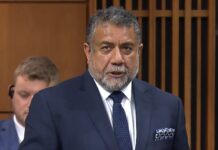
THE International Longshore and Warehouse Union Canada will meet with federal Transport Minister Marc Garneau in Vancouver on Tuesday to ask questions about possible port privatization; “cabotage” changes that could let Temporary Foreign Workers crew ships in Canadian inland water; and the potential that the American government could block Canadians from working in Canada through pre-clearance security measures.
(The meeting is open to the public on Tuesday, March 28 at 9 a.m. at #1400 – 515 West Hastings Street – Simon Fraser University’s Vancouver Campus.)
ILWU Canada President Rob Ashton will join with other Pacific Coast Maritime Unions at a meeting of the Pacific Coast Region – Canadian Maritime Advisory Council with Garneau, along with other stakeholder from the marine sector, including the shipping, fishing and tourism industries, First Nations, municipalities and others.
Ashton says the stakes are high given the potential loss of up to 12,000 jobs in proposed “cabotage” changes that would allow Temporary Foreign Workers to crew ships operating in Canadian inland waters for the first time, as well as the possible privatization of Canadian Ports.
“We have very serious concerns to express to Minister Garneau and we appreciate that for the first time in recent memory a Minister of Transport has come to Vancouver to hear stakeholders’ views directly,” said Ashton. “But we need more than a hearing – we need a commitment that the Liberal government will protect Canadian jobs, not give them away to other countries.”
Ashton also said the federal government is considering privatizing Canadian ports – including the Port of Vancouver – a move that maritime unions and other stakeholders strongly oppose.
“Our non-profit ports should not be for sale and should not be turned into profit centers for multinational corporations,” Ashton said. “It would mean higher prices for shippers and consumers alike and put jobs at risk.”
The maritime unions are also concerned about possible action by the new U.S. Donald Trump government to use security pre-clearance of Canadians employed in Ports in Canada to prevent some workers from doing their jobs.
“There is no way that the Trump administration should be able to block Canadians from doing their jobs so long as they pass Canadian security clearances,” Ashton said. “Interference from the U.S. or any other country into Canadian workers’ jobs is absolutely unacceptable.
Ashton said the unions will also be asking for a comprehensive meeting with the federal government to discuss these and other concerns in more detail than possible at the Pacific Region CMAC meeting, something that happens with industry but not unions.












